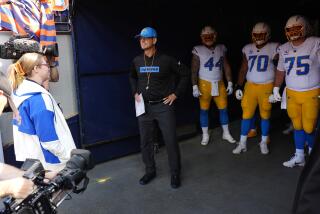Someone to Help Resolve All Your ‘Issues’
- Share via
Five years ago, Bob Pranga’s life was a mess.
Unable to get his acting career off the ground, he was $60,000 in debt and working three jobs as a waiter, tour guide and department store clerk to keep afloat.
Instead of turning to a therapist or a credit counseling agency to turn his life around, he hired Rick Tamlyn, a personal or life coach from Sherman Oaks. They talked every week, with Pranga paying $50 a visit to sort out what was important to him and how to develop a plan for getting it.
A year later, Pranga had paid off his debt and reinvented himself as Doctor Christmas, “tree stylist to the stars.” He gives Tamlyn credit for his personal transformation--another testimonial to one of the world’s youngest professions.
Want to leave your corporate job and start a dot-com? Get the feeling you spend your whole life toiling for things you don’t really need or even want? Wish you could meet and cohabit with Dr. Perfect? Those are a few of the problems people bring to personal coaches, whose ranks have swelled to at least 10,000 since the early 1990s. (Oops, did we say problems? Excuse us. Coaches, never negative, prefer words like “longings” or “issues.”)
Pranga, 38, now makes his living decorating the Christmas trees of such celebrities as Bob Hope, Andy Garcia, Carrie Fisher and her mother, Debbie Reynolds, at $10,000 to $15,000 a pop.
The idea for the business came to Pranga before he hired Tamlyn: Actress Mia Farrow admired a Christmas tree with the sparkle of a Bob Mackie gown that Pranga had done for Macy’s department store in Manhattan, where the Michigan native then lived.
But Pranga gives Tamlyn, 41, credit for the key insight: showing him how much he loves freedom, and that he had to organize his life around it, rather than jobs with set hours or supervision.
Does that advice sound obvious in hindsight? Nancy Koehn, a business historian at Harvard Business School, says coaching is a gussied-up description of an age-old role. “Every entrepreneur I’ve ever studied has had something like a life coach. They just weren’t called that.”
For example, Koehn said, 18th century English potter Josiah Wedgewood had an older, wiser partner whose counsel he valued. And pickle pioneer Henry Heinz, after going bankrupt, started his business anew with reliance on such trusted advisors as his wife, a brother and a cousin.
Personal coaches vary in their methods, but most ask tough questions, brainstorm and nudge clients into remaking themselves. They may function as nags, hand-holders, sounding boards, advisors and sources of information. Most meet with their clients over the phone, a convenience that traffic-phobic Angelenos appreciate.
They help clients formulate plans of action, then break them down into specific steps with deadlines. Ideally, the coach follows up with phone calls or e-mails to make sure the client has stayed on track and to provide encouraging but objective feedback.
“Accountability is big,” Tamlyn said. He frequently asks clients: “What are you going to do? By when will you do it, and how will I know you’ve done it?”
Skeptics wonder what a life coach can do for a client that a candid friend or insightful confidant could not do just as well. Others wonder why clients do not hire a licensed therapist who is sensitive to career issues. But Pranga said he sought out a coach rather than a therapist because he wanted something more “proactive” than traditional therapy. He was less concerned with analyzing what was blocking his happiness than in changing his life.
“We don’t go into the ‘Why?’ place much,” Tamlyn said. “We go into ‘What do you want and how do you get there?’ ”
Tamlyn comes from a school of coaching that believes clients already have most of the answers. He begins with the assumption that “nothing is broken” in the person who hires him; the client just needs some help discovering his or her own solutions.
Although personal coaches are becoming almost as popular as personal trainers among the affluent and ambitious, especially in Los Angeles, New York and other cities where trends are set, it was not always so.
“When we first started this years ago, when I said I was a coach, people’s first question was ‘What sport?’ ” said Cynthia Loy Darst, who coaches 20 clients from her home in the San Fernando Valley.
The fact that coaches may counsel clients who have psychological problems troubles some observers, including therapists.
“My major concern with any of these things is: Are the people doing it sufficiently skilled in understanding psychological issues to handle what might come up?” said Stephen Goldblatt, a clinical psychologist who heads a San Francisco-based service for the newly wealthy called the Money, Meaning and Choices Institute. He believes psychological training should be a prerequisite for whole-life counseling.
The profession was born 18 years ago when San Francisco accountant Thomas Leonard was asked by two clients to join a discussion not about taxes or estate planning but about their lives. Among the questions on the table: Should they have children and what color BMW to buy?
Leonard called himself a life planner until 1988, when another client said he was a like a coach. He said he read straight through the dictionary looking for a better term for what he did and could not find one. Leonard, who founded and later sold Coach University, the first school for coaches, estimates there are at least 10,000 coaches in the world, 80% of them in North America.
New York City-based business writer Harriet Rubin has hired half a dozen life coaches over the last decade. “The way some women have plastic surgeons, I have life coaches,” joked Rubin, author of the bestseller “The Princessa: Machiavelli for Women.”
In the last two months, she has consulted with a new coach to help her deal with the issue of “how a woman’s voice can be heard in a man’s world,” she said.
Unlike Pranga, Rubin says none of her coaches has transformed her life.
“I haven’t had any that were very practical,” she said.
Yet she continues to seek them out, drawn by their almost devotional attention to her.
“Even if you get bad advice, it’s that attention,” she said.
Stever Robbins, 36, a life coach in the Boston area who works with start-up companies, said life coaches are increasingly sought after in Boston, Silicon Valley, Los Angeles and other places where stock-option fortunes have not brought anticipated bliss.
Many clients hope to create a better Brand Me to compete in a Darwinian marketplace. But even for his driven dot-com clients, achieving “life balance” is usually an important goal.
“As wealth increases, I think people also care more about personal development,” he said.
With younger and younger people controlling more and more money, it is not surprising that many are willing to pay for guidance, just as they pay $5 for a latte, said Samuel Culbert, a management professor at UCLA.
Although coaches are careful to distinguish themselves from therapists, coaches often have similar access to the most intimate concerns of their clients. They say they refer clients to therapists when they sense a serious psychological problem. But many clients are aware that saying “my coach” instead of “my shrink” is less likely to raise eyebrows. Since coaching appeals to problem solvers, many clients have both therapist and coach.
Coaches come from varied backgrounds. Tamlyn and Darst were once actors. Some therapists have abandoned their practices to coach, some because they prefer dealing with people who are not seriously troubled, some because coaching is more lucrative than therapy in an age of managed care.
Howard Spizer heads the Southern California chapter of the International Coach Federation with Tim Cline, a clinical psychologist at UCLA, who also coaches. Spizer had an earlier career as a health-care administrator but said he has been coaching informally for more than 25 years.
“It’s an inherent process for me,” Spizer said. “I think it’s kind of hard to learn this profession. You’ve either got it or you don’t.”
Spizer charges $350 to $2,500 a month to help a client set and achieve goals. His insight and cheerleading are usually delivered in three or four half-hour phone calls a month.
To become a coach, most aspirants take courses, such as those offered by Coach University, where students must complete a minimum of 200 hours of courses to earn a basic graduation certificate, said chief operating officer Pamela Richarde. The program takes from 18 months to two years to complete, she said.
Courses are given over the phone by faculty members who have been trained by Coach U. They include instruction on how to listen, how to give advice, how to relate to clients and how to determine a particular client’s type. For example, an entrepreneurial type might require a different approach than, say, a an executive type.
The other major school for coaches, Coaches Training Institute in San Rafael in Northern California, offers face-to-face contact with instructors, as well as advanced courses by telephone.
As often happens in maturing professions, credentials have become an issue among coaches. The International Coach Federation, based in Washington, D.C., is trying to set uniform standards of competency for coaches and offers credentialing. But there are no laws to prevent an untrained--or unscrupulous--person from claiming to be a personal coach.
“You can get ripped off if you don’t know what you’re doing,” said Ronald Krannich, a business writer and publisher in Manassas, Va. “You need to know how to shop for these people.”
He suggested interviewing prospective coaches, checking references and considering such low-cost alternatives as finding or starting a support group.
Culbert, who is also a clinical psychologist, believes people should be especially wary of any coach who functions more as a guru than a guide.
“Anybody who leads you to believe they’re smarter about you than you are, that’s a dangerous human being,” he said. “We’ve all got to invent our own lives.”


